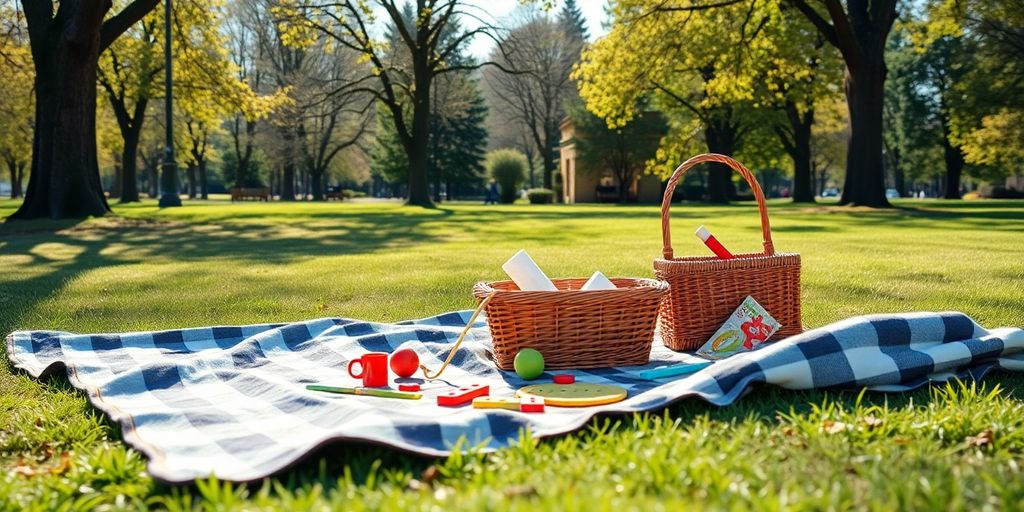Weekends should be a time to unwind and enjoy life, but they can sometimes feel like a race against the clock. To help you make the most of your time off, I’ve put together some easy life hacks for planning your weekends. Whether you want to relax at home or go on an adventure, these tips will help you create enjoyable weekend plans without the stress.
Key Takeaways
- Plan meals ahead of time to save cooking stress.
- Use a weekend planner to map out activities in advance.
- Create a list of fun things to do to avoid last-minute scrambling.
- Keep track of your spending to stay within budget.
- Set up a family calendar to coordinate plans and events.
1. Meal Prep

Okay, let’s talk meal prep. I know, I know, it sounds like a huge commitment, but trust me, it’s a game-changer for easy weekends. Think about it: no more last-minute grocery store runs or panicking about what to make for dinner after a long day. You’ll actually have time to relax and enjoy your weekend.
Meal prep is your secret weapon for reclaiming your weekends.
Here’s the deal: you don’t have to go all-out and prep every single meal for the entire week. Start small. Maybe just focus on prepping lunches or dinners. Or even just prepping ingredients, like chopping veggies or cooking a big batch of grains. The goal is to make your life easier, not to add more stress. You can find healthy food and drink options to get you started.
I used to dread weekends because I’d spend so much time cooking and cleaning up. Now that I meal prep, I actually have time to do things I enjoy, like reading, hiking, or just hanging out with friends. It’s amazing how much time you can save when you plan ahead.
Here are a few ideas to get you started:
- Plan your meals: Take some time to sit down and plan out what you want to eat for the week. This will help you create a grocery list and avoid impulse buys.
- Shop smart: Stick to your grocery list and buy ingredients that can be used in multiple meals. This will save you time and money.
- Prep in batches: Cook a big batch of grains, roast a bunch of vegetables, or make a big pot of soup. Then, divide the food into containers and store them in the fridge or freezer. This way, you’ll have ready-to-go meals whenever you need them. You can even try weekly meal prep to make it a habit.
Here’s a simple example of how you could break down your meal prep:
| Meal | Option 1 | Option 2 |
|---|---|---|
| Lunch | Salad with grilled chicken | Leftover soup |
| Dinner | Sheet pan fajitas | Pasta with marinara sauce |
Don’t be afraid to experiment and find what works best for you. The most important thing is to make meal prep a sustainable habit that fits into your lifestyle. You can also simplify meal prep by freezing double portions.
2. Weekend Planner

Okay, so you’re ready to actually plan your weekend, huh? It’s more than just thinking about it; it’s about putting it down on paper (or, you know, in your favorite app). A little planning goes a long way in making sure you actually do the things you want to do.
Think of it like this: if you don’t plan, you’re just hoping for the best. And hoping isn’t a strategy. Let’s turn those weekend dreams into reality. You can use a physical planner, a digital calendar, or even just a simple to-do list. The key is to get those ideas out of your head and into a tangible form. This helps you visualize your time and make sure you’re not overbooking yourself. Plus, there’s something super satisfying about checking things off a list, right?
Planning ahead also means you can snag those reservations, book tickets, or gather supplies before the last minute rush. Trust me, future you will thank you for it.
Here’s a few things to consider when you’re crafting your weekend plan:
- Prioritize: What are the absolute must-dos? Put those in first.
- Be realistic: Don’t try to cram too much in. Leave room for spontaneity and relaxation.
- Factor in travel time: Nothing’s worse than underestimating how long it takes to get somewhere.
- Share the plan: If you’re planning with others, make sure everyone’s on the same page.
With a solid weekend planner, you’re not just filling time; you’re creating experiences. You can use planning tips to enhance productivity and organization. So, grab your favorite planning tool and let’s make some weekend magic happen!
3. Activity List
Okay, so you’ve got your meals planned and your weekend blocked out in the planner. Now for the fun part: figuring out what you actually want to do! Don’t just let the weekend slip by in a blur of Netflix and chores. Let’s make a list of possibilities. This is where you brainstorm all the things that sound appealing, no matter how big or small.
Think about what recharges you. Is it being outdoors? Getting creative? Spending quality time with loved ones? Or maybe just having some peace and quiet? Write it all down. No judgment here!
- Go for a hike in a nearby park.
- Try out a new recipe (maybe one you prepped for!).
- Visit a local museum or art gallery.
- Have a game night with friends or family.
- Start that book club you’ve been meaning to join.
Having a list ready means you won’t waste precious weekend time scrolling endlessly, trying to decide what to do. It’s like having a menu of awesome possibilities at your fingertips. Plus, it helps prevent that Sunday evening feeling of "where did the weekend go?"
Consider these categories when brainstorming:
- Outdoor Adventures: Hiking, biking, kayaking, picnics.
- Creative Pursuits: Painting, writing, playing music, crafting.
- Social Gatherings: Dinner parties, game nights, movie nights.
- Relaxation & Self-Care: Reading, taking a bath, meditation.
- Learning & Exploration: Visiting museums, attending workshops, exploring new neighborhoods.
Don’t be afraid to include things that seem a little out of your comfort zone. You might discover a new passion! And remember, this list is a living document. Add to it whenever inspiration strikes. You can even get the whole family involved in brainstorming. Make it a collaborative effort! This way, you’ll always have fun ideas ready to go for your weekends.
4. Budget Tracker
Okay, let’s talk money. It’s not always the most fun topic, but it’s super important for making those weekend dreams a reality. You don’t want to be stressing about cash when you’re supposed to be relaxing, right? A budget tracker can be your best friend here. It doesn’t have to be complicated – a simple spreadsheet or even a notebook will do. The goal is to know where your money is going so you can make smart choices about discretionary spending.
Knowing your budget is the first step to guilt-free fun.
Here’s a simple way to get started:
- List your income: Know how much money you have coming in.
- Track your fixed expenses: Rent, utilities, car payments – the stuff you gotta pay no matter what.
- Estimate variable expenses: Groceries, gas, entertainment. This is where you can make adjustments.
Think of your budget as a roadmap, not a prison. It’s there to guide you toward your goals, not to restrict you. It’s about making conscious choices so you can enjoy your weekends without the financial hangover.
Consider using apps that help you save without even thinking about it. These apps can transfer money into a dedicated account that you can use for vacation purposes. Similar to a savings account, you can withdraw your money when you’re ready to use it. Otherwise, set it and let it grow! You can also use a budget planner to keep track of your spending.
Here’s a sample table to help you visualize your budget:
| Category | Estimated Cost | Actual Cost | Notes |
|---|---|---|---|
| Accommodation | $200 | $180 | Found a cheaper hotel! |
| Activities | $100 | $120 | Splurged on that fancy dinner. |
| Food | $150 | $130 | Packed some snacks to save money. |
| Transportation | $50 | $40 | Used public transport instead of taxis. |
| Total | $500 | $470 | Under budget! |
By tracking your spending, you can identify areas where you can cut back and save more for those amazing weekend getaways. You can also use a budget planner to help you track your spending. Remember, it’s all about balance and making choices that align with your priorities. So, go ahead, plan that weekend, and enjoy it knowing you’ve got your finances under control. You can also use a budget planner to help you track your spending.
5. Packing Checklist

Packing can feel like a chore, but it’s your gateway to freedom! A well-thought-out packing checklist is your secret weapon against overpacking and forgetting essentials. It’s about being prepared, not overwhelmed. Trust me, nothing ruins a weekend faster than realizing you forgot your toothbrush or your favorite swimwear for aquatic activities.
Think of your packing checklist as a personalized roadmap to relaxation. It’s not just about clothes; it’s about peace of mind. You can actually enjoy your trip, knowing you’ve got everything covered. I used to dread packing, but now I see it as the first step of my adventure.
A packing checklist isn’t just a list; it’s a promise to yourself that you’re prepared to embrace the weekend without unnecessary stress. It’s about curating an experience, not just filling a bag.
Here’s how I usually break down my packing list:
- Clothing (versatile pieces that can be mixed and matched)
- Toiletries (travel-sized, of course!)
- Electronics (phone, charger, maybe a camera)
- Essentials (medications, glasses, contact solution)
- Fun stuff (books, games, whatever makes you happy)
I even have a separate list for different types of trips. For example, a beach weekend requires a whole different set of items than a city escape. The key is to tailor your list to your specific needs and activities. This way, you’re not just packing; you’re preparing for an amazing experience. Don’t forget to check your travel security before you leave!
6. Reservation System

Okay, so you’ve got your destination, activities, and maybe even a rough itinerary. Now, let’s talk about locking things down. A solid reservation system is your best friend for a stress-free weekend. I can’t tell you how many times I’ve shown up somewhere, only to find out it’s completely booked. Don’t let that be you!
Think about it: you’re trying to relax, not scramble for last-minute openings. Plus, booking ahead often gets you better deals. It’s a win-win.
I used to be a ‘wing it’ kind of traveler, but after one too many disappointments, I learned my lesson. Now, I book everything I can in advance. It just makes the whole experience so much smoother.
Here’s what I usually do:
- Restaurants: Especially for dinner, and especially if it’s a popular spot. Use apps or call ahead. I like to use customized reservation forms for various booking scenarios to make sure I get the time I want.
- Activities: Tours, museums, anything with limited capacity. Book those tickets online. I always check Chic Finds Hub for travel insights and recommendations.
- Accommodation: This is a no-brainer. Whether it’s a hotel, Airbnb, or even a campsite, get it booked. An online accommodation booking system simplifies reservation management and makes it easy to find the perfect place.
I’ve found that using a scheduling software can be a lifesaver, especially if you’re coordinating with a group. It helps everyone stay on the same page and avoids any double-booking disasters. For teams or groups, a flexible room booking system can be a great solution. There are also numerous apps available to assist in planning family trips, offering features for locating restaurants, accommodations, and notable tourist attractions at various destinations.
7. Family Calendar
It’s easy to let weekends slip away without really connecting as a family. That’s where a family calendar comes in! It’s not just about scheduling appointments; it’s about creating shared experiences and making sure everyone feels heard. A well-maintained family calendar can be the cornerstone of a smoothly running and connected household.
Think of it as your family’s central hub for all things weekend-related. It’s a place where you can coordinate activities, manage expectations, and ensure that everyone gets a say in how your precious weekend time is spent. It’s about being purposeful with your time and making memories that last.
- Choose a Calendar System: Decide whether you want to use a digital calendar app family calendar app (like Google Calendar, Cozi, or FamCal) or a physical one (like a whiteboard or wall calendar dry-erase calendar).
- Involve Everyone: Make it a family affair! Sit down together and brainstorm activities, events, and appointments that need to be added to the calendar. This gives everyone a voice and helps build anticipation for the weekend.
- Color-Code for Clarity: Use different colors for each family member or activity type. This makes it easy to see at a glance who’s doing what and when calendar organization.
- Set Reminders: Don’t rely on memory alone! Set reminders for important events and appointments so that no one misses out.
- Regular Check-Ins: Schedule regular family check-ins to review the calendar and make any necessary adjustments. This ensures that everyone is on the same page and that the calendar remains up-to-date.
A family calendar isn’t just about scheduling; it’s about creating a shared understanding of your family’s priorities and commitments. It’s a tool for building stronger relationships and making the most of your time together. It’s about intentionality and making sure that your weekends reflect your family’s values.
By implementing a family calendar, you’re not just organizing your weekends; you’re investing in your family’s well-being and creating a more connected and fulfilling life. It’s a simple trick that can make a big difference in how you spend your time and the memories you create. Consider how you can enhance time management by using a family calendar.
Embrace Your Weekend Adventure
As you wrap up your weekend planning, remember that the goal is to create moments that feel special and rejuvenating. It’s all about finding that balance between relaxation and fun. Whether it’s a spontaneous road trip or a cozy movie night at home, what matters is that you enjoy your time. Don’t stress about making every weekend perfect; just focus on making them meaningful. So go ahead, try out these tips, and see how they can transform your weekends into something you truly look forward to. Life’s too short for boring weekends—make them count!
Frequently Asked Questions
What is meal prep and why is it important for weekends?
Meal prep means preparing meals in advance, so you have food ready to eat. This saves time and helps you avoid stress about what to cook during the weekend.
How can a weekend planner help me?
A weekend planner helps you organize your activities and appointments. It makes it easier to see what you want to do and when, so you can make the most of your time.
What should I include in my activity list?
Your activity list can include fun things like going to the park, visiting friends, or trying a new restaurant. It’s a way to keep track of what you want to do.
Why do I need a budget tracker for weekends?
A budget tracker helps you keep an eye on how much money you’re spending. It ensures you don’t run out of funds for fun activities or unexpected costs.
What is a packing checklist and how does it help?
A packing checklist is a list of items you need to take with you when you go out. It helps you remember important things, so you don’t forget anything.
How can a family calendar improve our weekends?
A family calendar shows everyone’s plans and activities. It helps avoid conflicts and ensures everyone knows what’s happening, making weekends smoother.







